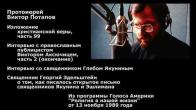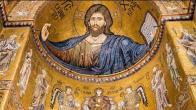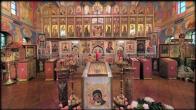You are here
St. Xenia of Petersburg
24 January/6 February
 Saint Xenia was the wife of Colonel Andrew Theodorovich Petrov, who served as a court chanter. At twentysix years of age, Xenia was widowed and, it seemed, lost her mind from grief. She distributed her possessions to the poor, clothed herself in the clothes of her reposed husband, and, as if having forgotten her own name, called herself by the name of her reposed husband Andrew Theodorovich.
Saint Xenia was the wife of Colonel Andrew Theodorovich Petrov, who served as a court chanter. At twentysix years of age, Xenia was widowed and, it seemed, lost her mind from grief. She distributed her possessions to the poor, clothed herself in the clothes of her reposed husband, and, as if having forgotten her own name, called herself by the name of her reposed husband Andrew Theodorovich.
These eccentricities were not tied to the loss of reason, but only signified a complete disdain for earthly good things and human opinion, which places these good things at the center of existence. Thus, Xenia of Petersburg took upon herself the difficult ascesis of foolishness for Christ's sake.
Having come to know, through the death of her beloved husband, all the inconstancy and illusoriness of earthly happiness, Xenia strove toward God with all her heart and sought protection and comfort only in Him. Earthly, transitory good things ceased to have any value for her. Xenia had a house; but she gave it over to an acquaintance under the condition that she give shelter in it to paupers. But Xenia herself, not having a refuge, would wander among the paupers of Petersburg, while at night she would go out to a field, where she spent the time in ardent prayer.
When they began to build a church in the Smolensk Cemetery, Xenia, after the onset of darkness, would secretly carry bricks to the top of the construction, and thereby helped the masons erect the walls of the church.
Some of Xenia's relatives wanted to take her in and provide her with all necessities, but the blessed one replied to them: "I do not need anything".
She was glad of her indigence, and when passing by somewhere, would at times remark: "I am all here". When her reposed husband's clothing decayed, Xenia clothed herself in the poorest clothing, and on her feet wore torn shoes without stockings. She did not wear a warm dress and forced her body to suffer from the severe cold.
Sensing the greatness of Blessed Xenia's soul, the inhabitants of Petersburg loved her, because she despised the earthly for the sake of the Kingdom of Heaven. If Xenia would enter into anyone's home, this was considered a good sign. Mothers rejoiced if she kissed their children. Cab drivers would ask permission of the blessed one to drive her a little, since after this the earnings would be guaranteed for the whole day. Merchants in the bazaars would try to give here kalach [a fancy bread translator] or some food. And if Blessed Xenia took something from what was offered, then all the wares of the seller would quickly be bought up.
Xenia had the gift of clairvoyance. On the eve of the Nativity of Christ in the year 1762, she walked about Petersburg and said: "Bake pancakes; tomorrow all Russia will bake pancakes" [for memorial meals translator].
The next day, the Empress Elizabeth Petrovna, suddenly died. A few days before the murder of the royal youth, John VI (Antonovich, the greatgreatgrandson of Tsar Alexis Michailovich), who in infancy had been proclaimed the Russian Emperor, the blessed one wept and repeated: "Blood, blood, blood". Within a few days after Mirovicha's unsuccessful conspiracy, the young John was killed.
Once, Xenia came to a home where there was a grownup daughter. Turning to the girl, she said: "Here you are drinking coffee, while your husband is burying his wife at Okhta". After a certain time, this girl really did enter into marriage with a widower who at that moment was burying his first wife at the Okhta Cemetery.
Blessed Xenia died at the end of the 18th century, but tradition has not preserved either the year or the day of her decease. They buried her in the Smolensk Cemetery, where she had helped to build the church.
Pilgrimages to her grave began shortly after her decease. Blessed Xenia often appeared in visions to people in difficult circumstances, forewarned of dangers and saved from calamities. The righteous one has not ceased to show compassionate love toward all who with faith have called upon her, and many instances of her help for the suffering and those in desperate situations are known.
A Grodno civil servant, Nicholas Selivanovich Golovin, lived in Grodno approximately until the year 1907 and often experienced unpleasantness at work. He came to Petersburg to put his affairs in order, but they became even more entangled. Golovin was very poor, and in his care were his elderly mother and two sisters. In despair, he walked along the streets of Petersburg, and although he was a believing man, the thought to throw himself into the Neva stole into his soul. At this moment, in front of him stood some unknown woman, who struck him by her appearance and was partly reminiscent of a poor nun. "Why are you so sad?", she asked. "Go to the Smolensk Cemetery, serve a panichida for Xenia, and everything will settle down".
After these words, the unknown woman became invisible. Golovin fulfilled the advice of the mysterious nun, and his affairs unexpectedly were settled in the best manner possible. He returned home to Grodno joyful.
Emperor Alexander III, when he was the heir, became ill with a serious form of typhus. The Grand Duchess Maria Theodorovna was very alarmed by her spouse's illness. One of the valets, seeing her in the corridor, related to her how Blessed Xenia helps the sick, gave her sand from the cherished grave and added that he himself had been healed from illness by the prayer of the righteous one. The Grand Duchess placed the sand under the pillow of the patient, and in that same night, she, while sitting at the head of the bed, had a vision of Blessed Xenia, who told her that the patient would recover and in their family a daughter would be born. She should be called Xenia. The prediction of the blessed one was fulfilled exactly.
In the Pskov province, a relative from Petersburg came to stay for a while with a landowner and recounted how they revere Blessed Xenia in the capital. Under the influence of this account, the pious landowner prayed before sleep for the repose of her soul. At night, she dreamed that Xenia was walking round her house and pouring water on it. In the morning, the hay barn on the country estate caught on fire, but the fire did not spread further and the home remained whole.
A colonel's widow arrived in Petersburg to enroll her two sons into the Cadet Corps. She did not succeed in this. The money borrowed for the trip had come to an end, and the widow walked along the street and bitterly wept. Suddenly, some woman of the common people came up to her and said: "Serve a panichida for Xenia, she helps in sorrows". "Who is this Xenia?", asked the colonel's widow. "The tongue [that asks the way] will lead to Kiev", answered the woman of the common people and quickly vanished.
Indeed, the colonel's widow easily learned who this Xenia was, served a panichida for her at her grave in the Smolensk Cemetery, and shortly after unexpectedly received news that both her sons were accepted into the Corps.
A multitude of similar instances of Blessed Xenia's help are known also in our days.
Troparion
Spurning the vanity of this earthly world, thou didst take up the cross of a homeless life in wandering: thou didst not fear tribulations, deprivations and the mockery of men, but didst come to know the love of Christ, wherein thou dost now delight in heaven. O divinely wise and blessed Xenia, pray thou for the salvation of our souls.
Relics in cathedral - monthly calendar
| S | M | T | W | T | F | S |
|---|---|---|---|---|---|---|
|
|
|
|
1
|
2
|
3
|
4
|
|
5
|
6
|
7
|
8
|
9
|
10
|
11
|
|
12
|
13
|
14
|
15
|
16
|
17
|
18
|
|
19
|
20
|
21
|
22
|
23
|
24
|
25
|
|
26
|
27
|
28
|
29
|
30
|
31
|
|
PARISH LIFE
Address of our Cathedral
While all the materials on this site are copyrighted, you may use them freely as long as you treat them
with respect and provide attribution on the Russian Orthodox Cathedral of St.John the Baptist of Washington DC.









